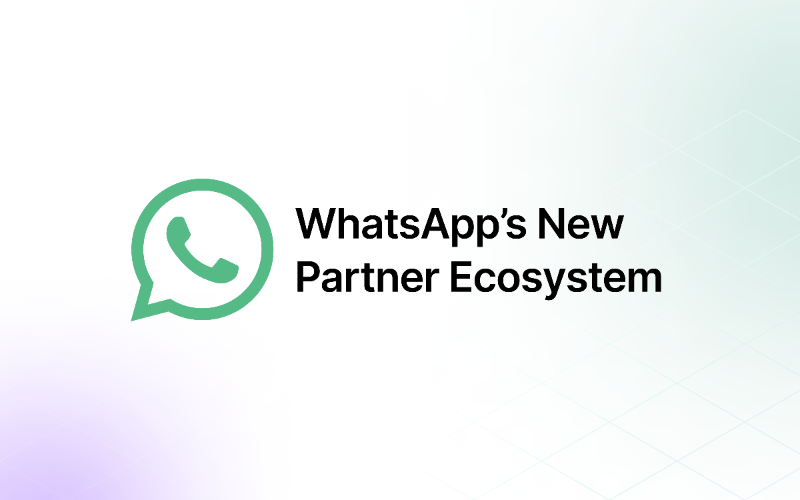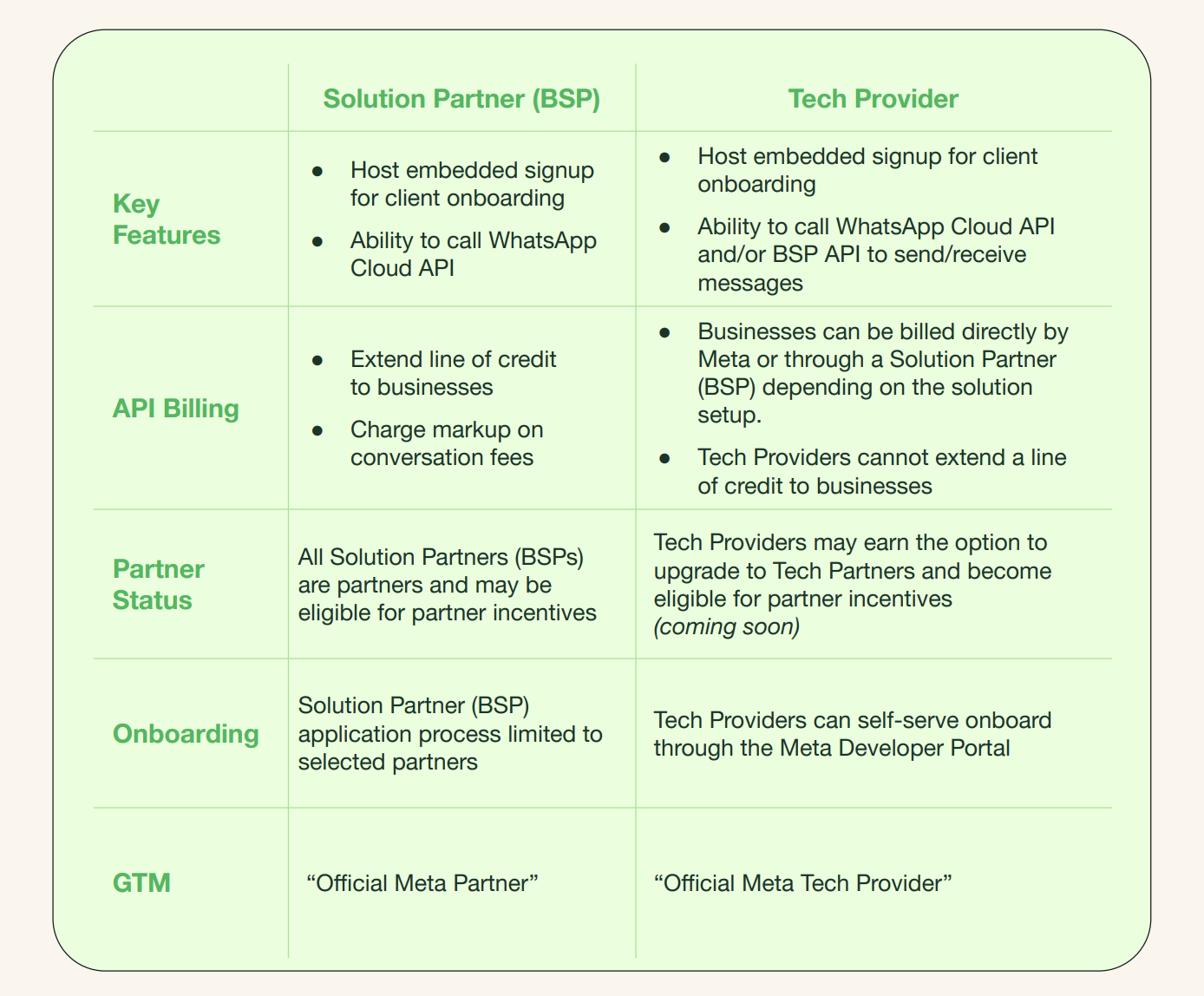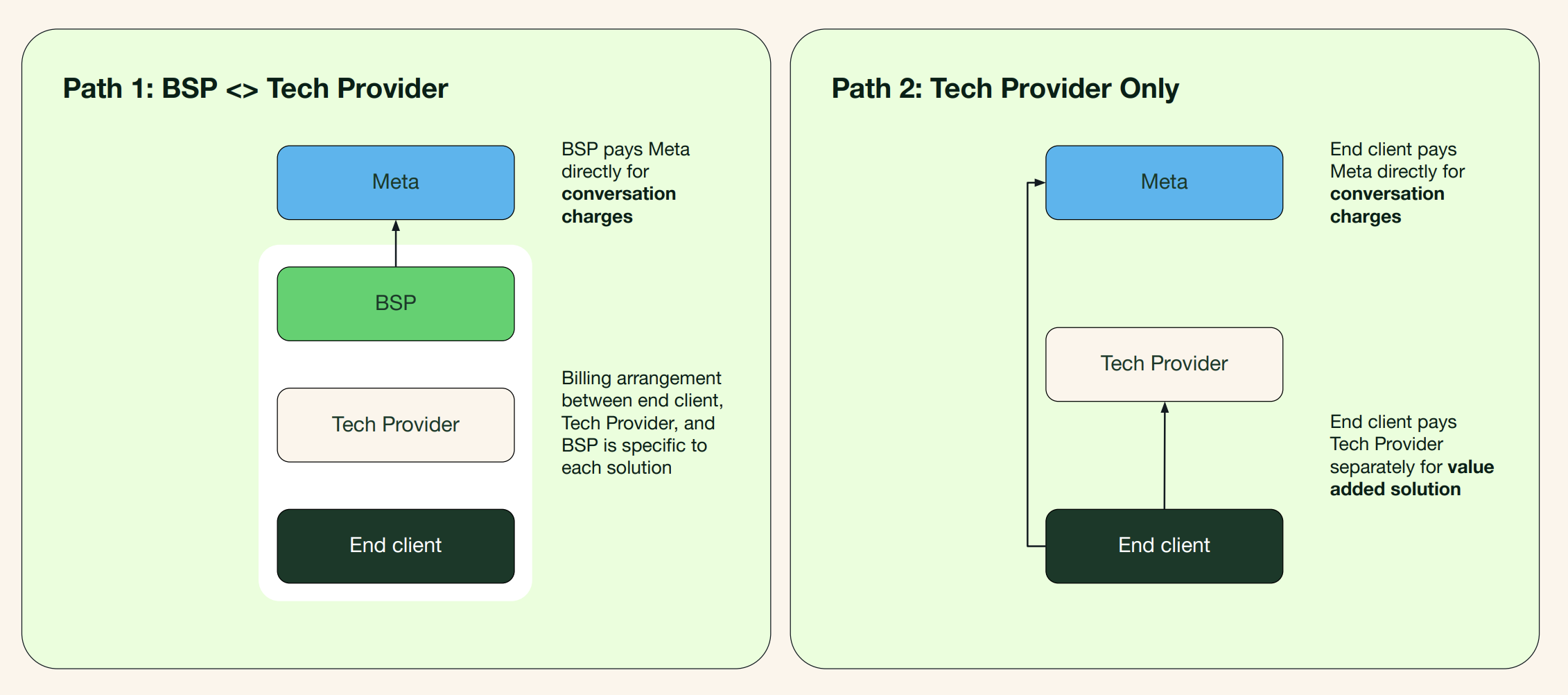WhatsApp's New Tech Partner Ecosystem: A Game Changer for Business Communication

Contents
Introduction
Since its inception, WhatsApp has significantly transitioned from a peer-to-peer messaging platform to a crucial touchpoint for businesses worldwide.
With Meta's continuous evolution of WhatsApp's features, it's clear that the platform is not just another communication tool but a potential disruptor in the business ecosystem of this decade. At the heart of this transformation is the announcement of a new Tech Partner ecosystem, poised to redefine how businesses engage with customers.
WhatsApp's Evolution for Businesses
WhatsApp's journey towards becoming an indispensable business tool is marked by its innovative approach to business messaging. What started as a simple app for personal communication has evolved into a comprehensive platform for customer engagement, support, and transactional messaging. What was once acquired by Meta for $19 billion a decade ago can potentially become source of trillions of dollar of revenues.
Previously, business messaging was restricted to SMS and Emails. WhatsApp's entry into this market has reduced the SMS market by less than half of what it was 5 years ago (no wonder valuation of companies like Twilio has fallen over 80% on the Nasdaq). In fact, interestingly companies like Twilio and MessageBird that had dominating revenues from SMS as their leading growth engine have completely pivoted to being a new age engagement tool. Read the recent announcement of MessageBird here.
Being driven by data and internet, WhatsApp obviously outsmarts the vintage SMS technology that can only transmit alpha-numeric vanilla text. WhatsApp's rich texting capabilities with media, emojis etc., naturally places it a notch higher for effective business communication.
Meta is continuously innovating templating and interaction technology for businesses and the impact is already visible to end-customers, but there is a lot also happening in the B2B ecosystem of Meta, where billion dollar opportunities are getting created for tech innovators, ultimately helping Meta to become the #1 business messaging platform in the world.
Decoding the new Tech Partner Ecosystem
Who is a Tech Partner?
A Tech Partner is an organization that collaborates with WhatsApp to develop tools, platforms, or solutions that enhance the functionality and capabilities of the WhatsApp Business API and make it accessible to businesses for exploitation. These partners specialize in areas such as messaging automation, CRM integration, analytics, or security and compliance.
Tech partners work closely with WhatsApp to ensure that their solutions are compatible with the WhatsApp Business API and meet the platform's standards and guidelines. They businesses with software development kits (SDKs), APIs, documentation, and technical support to facilitate the integration process and enable businesses to leverage WhatsApp's messaging platform effectively.
To become a Tech Partner of WhatsApp, an organisation needs to first register with Meta as a Tech Provider, and demonstrate its capability of driving tech and business innovation by meeting some business eligibility criteria.

How is this different from the existing Business Solution Provider (BSP)?
WhatsApp's Business Solution Provider (BSP) ecosystem was a framework introduced by WhatsApp to leverage the strength and power of existing cPaaS companies to popularize the use of WhatsApp for business messaging. CPaaS organisations like Twilio, MessageBird etc., immediately partnered with Meta as BSPs in advancing WhatsApp for businesses.
Under the new Partner ecosystem, BSPs are reconfigured as Solution providers that are now responsible for invoicing/ billing and spreading awareness of WhatsApp's technological innovations.

The biggest difference of a Tech Partner from a BSP is that a Tech Partner can onboard businesses directly on WhatsApp's Cloud APIs (without needing a BSP in between), in a manner that Businesses can directly deal with Meta from a commercial standpoint.
The Changing Landscape for BSPs: Navigating New Roles and Challenges
1. From Tech Innovators to Billing Entities
WhatsApp's new ecosystem outlines a somewhat limited role for BSPs, primarily focusing on invoicing and acting as resellers of WhatsApp. This delineation could lead to a future where BSPs, once at the forefront of integrating and innovating on WhatsApp, might see their roles reduced to that of billing entities. In this capacity, BSPs would aggregate payments and manage invoicing for businesses, a significant pivot from their earlier, more technologically driven functions.
Recommended Read: 6 reasons why you should work with a tech partner instead of a BSP
2. The Broader CPaaS Context
It's crucial to recognize that many BSPs are not solely focused on WhatsApp. They are part of the larger Communications Platform as a Service (CPaaS) industry, offering a range of services including SMS, voice, and video communications. Companies like Twilio, MessageBird, and Gupshup represent this broader spectrum of CPaaS providers who have historically leveraged their technical expertise to innovate and add value beyond mere reselling.
The shift towards a Tech Partner model could, therefore, push these companies back into a corner of the market where they are seen primarily as resellers of WhatsApp, potentially stifacing their ability to innovate within the WhatsApp ecosystem. This repositioning might divert their focus away from developing unique technological solutions, limiting their role to that of facilitators of access to WhatsApp's services.
3. Tech Partners as the New Innovators
In contrast, the Tech Partner model elevates a select group of providers to the status of "tech innovators", entrusted with driving the WhatsApp's capabilities forward. These Tech Partners are positioned to lead the charge in extending WhatsApp's functionalities to businesses, leveraging direct access to Meta Cloud APIs to create sophisticated, integrated solutions that enhance business communication.
This division of roles signifies a pivotal moment in the CPaaS and business messaging landscape. While Tech Partners are empowered to innovate and expand WhatsApp's use cases, traditional BSPs face the challenge of redefining their value proposition in an ecosystem.
4. Implications for the CPaaS Industry
The reorientation of BSPs towards billing and reselling functions could have broader implications for the CPaaS industry. Companies known for their innovation and technical prowess may need to revisit their strategies, focusing on differentiating their services in areas not directly related to WhatsApp. This could lead to a more segmented market, with Tech Partners leading technological innovation for WhatsApp, while other CPaaS providers concentrate on diversifying their offerings in the broader communication technology space.
- It would be interesting to acknowledge the recent significant pivot of Messagebird from a communications technology platform to an engagement platform (rebranded as Bird.com). Chekout their recent press release here.
- Similarly, Twilio has recently put significant focus on Twilio engage, hinting towards moving away from the traditional cPaaS to a value driven engagement and retention platform. It has combined its legacy platform Twilio with Segment, to provide a combined solution to growth teams of technology businesses.
5. The Future Role of BSPs
In the evolving WhatsApp ecosystem, BSPs will find their role more aligned with that of strategic consultants and solution providers, rather than gatekeepers of API access.
Incorporating these insights, the section on the impact of WhatsApp's new tech partner ecosystem on BSPs becomes even more critical, outlining a potential shift in their role towards billing entities and the broader implications for companies traditionally involved in CPaaS.
How does the Industry stand to benefit from this?
The transition to a Tech Partner ecosystem brings several concrete benefits for businesses:
- Direct Access to Meta Cloud APIs: Businesses enjoy a more reliable and real-time integration with WhatsApp via Tech Partners, who are not reselling WhatsApp and have their commercial relationship directly with Meta.

<
- Independence from On-Prem BSP/ISV Infrastructure: This reduces dependency on external infrastructures, streamlining operations, and enhancing system performance.
- Immediate Access to WhatsApp's Newest Technologies: Businesses can quickly adopt the latest features and innovations, staying ahead in customer engagement.Did you know you can build app-like experiences within WhatsApp, without changing your API?Unlock powerful flow experiences with a tech partner like Fyno
- Lower Operational Costs: Eliminating intermediaries can significantly reduce costs, as the ecosystem allows for direct engagement with WhatsApp.
- Simplified Compliance and Scalability: The cloud-based approach ensures easy compliance with data regulations and facilitates effortless scaling.
- Enhanced Data Analytics and Insights: Tech Partners offer advanced analytics tools for deeper insights into customer behavior and service performance.
We have covered the detailed impact in a dedicated article on how the new Tech Partner ecosystem positively impacts businesses here.
Fyno's Rapid Ascension to Tech Partner Status
Fyno stands out as one of the fastest entities in India to achieve Tech Partner status with WhatsApp. This achievement underscores Fyno's commitment to innovation, technical excellence, and delivering value. By meeting stringent criteria and demonstrating a profound understanding of WhatsApp's platform, Fyno now offers its clients unparalleled access to the latest messaging technologies, customized solutions, and strategic advantages in customer communication.

As WhatsApp continues to expand its Tech Partner ecosystem, the potential for disruption in business communication is immense. Businesses that adapt to this new model, especially with Tech Partners like Fyno, can expect to see significant improvements in customer engagement, operational efficiency, and competitive positioning.
Conclusion
WhatsApp's Tech Partner ecosystem marks a pivotal moment in the evolution of business communication. By understanding and leveraging the benefits of this ecosystem, businesses can transform their customer interactions and set new standards for excellence in the digital age. With partners like Fyno, the journey towards more connected, efficient, and personalized communication is just beginning.